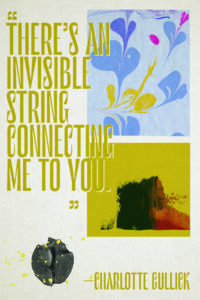
In our bathroom, there’s a worn 3×5 notecard taped to the mirror that reads, “There’s an invisible string connecting me to you.”
When my daughter, Hope, was five, we moved from Northern California to Austin, Texas because I had a new job as Chair of the Creative Writing Department at the community college. This isn’t a small distance to cover with a tiny person, so my husband and I asked his parents to help. They flew from Maryland to collect Hope. We were immensely grateful, but we were also sad to be without our beloved daughter for the longest time ever. We wrote her notes she could carry with her. The message taped to the bathroom mirror is one we had tucked into her small suitcase.
When we drove into Austin that first night, pummeled by the heat, I said to him, “There are people here we know.” I had a feeling that we were already joined somehow to individuals with full lives in this city. It was a rare, vivid moment of intuition, a visceral sense that we were already connected in this new place.
During our daughter’s first week of kindergarten, I talked to another mother: it turned out her in-laws lived in the town we’d come from. This woman and her family have become beloved. Our daughter has spent Shabbat dinners with them, and last weekend, we all went on a masked hike together, the two girls now eleven years connected.
Just now, my beautiful, bi-racial daughter emerges from her room. It’s one in the afternoon on a pandemic Saturday, where days run together like raindrops quickly turning into a flood. She has work due before school starts for AP History. Today was going to be a big push, but Chadwick Boseman’s death weighs on her—as it does on so many. I gather her in my arms, thinking about the invisible string connecting so many people to this man. His death, and his quiet fight with cancer, hum through the web, and we all feel it.
Watching my teen absorb another bitter pill in the week of the Kenosha shooting, it’s like ice in the gut. She’s studying our country’s brutal history, trying to make sense of the systemic ways we have created the inequity of our current world. And what I want her to know is this: There is another narrative we must connect to, one where we focus on vibrant living, which means full engagement with one another.
As a writer and a teacher of writing, one of my tasks is to help dismantle the myth of the solitary author. In fact, we exist within a web. One that sustains us–and we, in return, bolster the community when we acknowledge all the invisible and visible ways we are supported. I believe that one essential role of being a writer is to grow our vision, to adjust our perspectives. This might be a Zoom date with another writer where we simply discuss our potential work or it might be a masked walk with an old friend—right now, we have to actively seek out the connections.
We need others to help us move, to help us remember that despite the weight of loss and uncertainty that seems to loom larger every day, there is an invisible string connecting us all. We can focus on the divides or we can turn toward love, toward each other with our best selves, toward the way we need this world to be.
When I look in the mirror, I ask myself to be accountable to that 3×5 card, to consider and hold with reverence the connections tying me to so many people. The reverberations across those webs crackle with the possibilities of community, of who we can be in relation to each other, rather than just to ourselves.
Charlotte Gullick is our 2020 Gold Star for Teaching and Mentorship and will be a contributor for The Constellation Challenge, an immersive postcard-writing experience launching on November 1, 2020. You can read more about how to participate here.